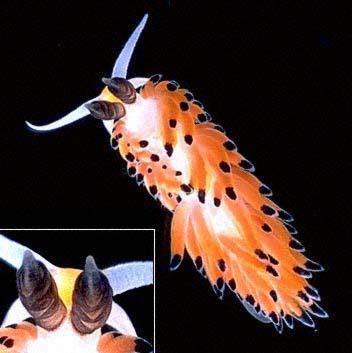
Favorinus tsuruganus
Baba & Abe, 1964
Order: NUDIBRANCHIA
Suborder: AEOLIDINA
Family: Glaucidae
DISTRIBUTION
Originally described from Japan and found uncommonly in eastern Australia down to about Sydney. I have also found it in New Caledonia so it probably a wide western Pacific distribution.
PHOTO
Angourie, North Coast, New South Wales, March 1982. Inset showing characteristic ornamentation on the rhinophores. PHOTO: Bill Rudman.
Body and oral tentacles opaque white. Ceratal wall translucent, but digestive gland duct is orange with a black tip, giving the species its characteristic colouration. The rhinophores are black and have three 'cup-shaped' or 'collar-like' swellings. When first described, the rhinophores were said to have 2 large swellings but in a subsequent description the authors described specimens with these cup-shaped swellings. To accomodate their earlier account they suggested the shape of the rhinophores was variable in this species, but I know of no subsequent reports of a similarly coloured animal with two swellings on the rhinophores. Species of Favorinus eat other opisthobranch eggs. In most species, the colour of the ceratal digestive gland is dependent on the colour of the eggs they are eating. In Favorinus tsuruganus however, the cerata are consistently yellow-orange with a black tip.
See Favorinus japonicus as an example of a species changing colour as the colour of its food changes.
References:
• Baba, K. & Abe, T. (1964) Record of Favorinus tsuruganus n. sp., from Tsuruga Bay, Japan (Nudibranchia - Eolidoidea). Publications of the Seto Marine Biological Laboratory, 12(2): 163-164.
• Baba, K. & Abe, T. (1975) Comments on further specimens of Favorinus tsuruganus Baba & Abe from Echizen-cho near Tsuruga Bay, Japan (Nudibranchia: Eolidoidea: Favorinidae). Publications of the Seto Marine Biological Laboratory, 22(1-4): 117-120.
Rudman, W.B., 1999 (March 19) Favorinus tsuruganus Baba & Abe, 1964. [In] Sea Slug Forum. Australian Museum, Sydney. Available from http://www.seaslugforum.net/find/favotsur
Related messages
Re: Colour forms of Favorinus tsuruganus
June 27, 2007
From: Colin Ogden

Concerning message #19909:
Hi Bill,
Richard Swann's photos of Favorinus tsuruganus fascinated me, and then one of the other dive operators here at Sodwana gave me a copy of one of his photos to get an ID on it. It appears to me a red form of Favorinus tsuruganus, but it is actually laying eggs on another egg ribbon from a Hexabranchus sanguineus (I think).
Locality: Sodwana Bay, 22 metres, South Africa, Indian, Upper photo: May 2007, Reef. Length: 20 mm. Photographer: Greg de Valle. Lower photo: February 2007, Photo: Colin Ogden.
Regards
Colin
scubaco@iafrica.com
Ogden C. M., 2007 (Jun 27) Re: Colour forms of Favorinus tsuruganus. [Message in] Sea Slug Forum. Australian Museum, Sydney. Available from http://www.seaslugforum.net/find/19965
Dear Colin,
Species of Favorinus are egg eaters, and the colour of their cerata, or rather the digestive gland duct in their cerata, changes as the colour of their food changes. I have a photo on the Fact Sheet of Favorinus japonicus changing colour, the cerata at the front being a different colour from those further back on the body. If you look at earlier messages on F. tsuruganus you will see the eggs of Hexabranchus appear to be one of its favourite foods and a good place to lay its eggs.
Best wishes,
Bill Rudman
Colour forms of Favorinus tsuruganus ?
May 23, 2007
From: Richard Swann
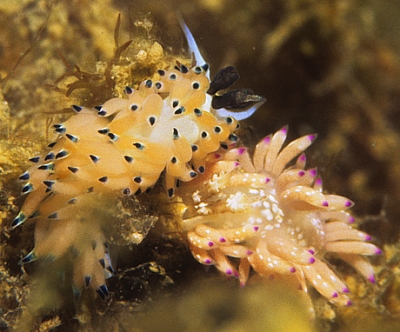
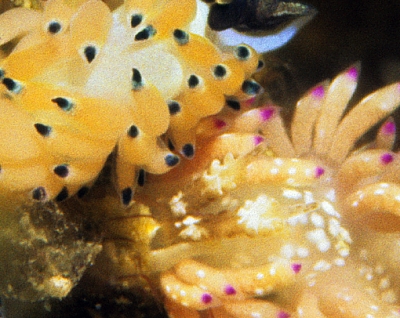
Concerning message #13700:
Hi Bill
I was reading Koh's message and think I have Favorinus tsuruganus with either F. japonicus or maybe F. mirabilis also. These guys are so small it is really tough to get good shots.
I found it strange that they were, when I first found them, in the mating position and would have said they were in the act. If they are different species do you have any knowledge of this being possible? I did consider that they could be feeding and not mating at all but no eggs seem to be present.
Locality: Sulug island, Kota Kinabalu, 23meters, Sabah, Borneo, South China Sea, 16 April 2007, Reef slope, outreef. Length: Around 5mm. Photographer: Richard Swann.
I also found the pink tips unusual. if they are not mating then they must be very good friends !
As always i look forward to hearing your thoughts.
Best regards
Richard
www.downbelow.co.uk
richard@downbelow.co.uk
Swann, R., 2007 (May 23) Colour forms of Favorinus tsuruganus ?. [Message in] Sea Slug Forum. Australian Museum, Sydney. Available from http://www.seaslugforum.net/find/19909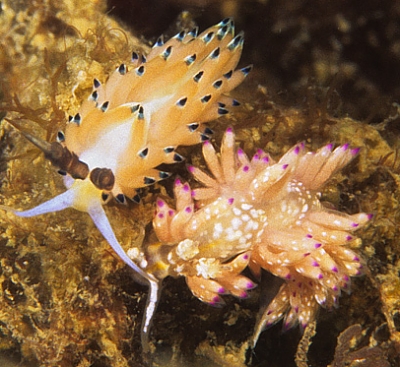
Dear Richard,
Certainly the yellow and black animal is Favorinus tsuruganus but the one with the purplish tips is rather unusual. It is quite similar in colour to an animal I have identified as Favorinus pacificus, but that species has smooth rhinophores. Favorinus mirabilis is also similar in colour but always has a dark spot near the ceratal tip and its rhinophores have many more leaves.
Typical Favorinus tsuruganus has three quite unusual cup-shaped processes on each rhinophore, which is a very distinguishing feature. I have looked carefully at the rhinophores of the purple-tipped animal and although they are not black, there do seem to be three very similarly shaped cup-shaped structures there as well. I know of no other species of Favorinus with similar structures, so your observation that they appear to be mating would suggest that this is a colour form of F. tsuruganus which has never been reported before. Which makes it a very interesting find.
One problem - and there are often problems unfortunately - is the identity of Favorinus tsuruganus. All authors accept it is the yellow animal with black-tipped cerata, and black rhinophores with these 3 cup-shaped structures. This is certainly the animal illustrated and described by Baba & Abe in 1975. However in that paper they note that the animal on which the species is based (Baba & Abe, 1964) didn't have these 3 cup-shaped structures on the rhinophores. It just had two rounded swellings. Either they made a mistake in their first description, or perhaps they had a damaged animal which had not regrown the rhinophores very well. Perhaps I shouldn't have mentioned it, but it does mean the identity of F. tsuruganus is still a little unstable.
-
Baba, K. & Abe, T. (1964) Record of Favorinus tsuruganus n. sp., from Tsuruga Bay, Japan (Nudibranchia - Eolidoidea). Publications of the Seto Marine Biological Laboratory, 12(2): 163-164.
-
Baba, K. & Abe, T. (1975) Comments on further specimens of Favorinus tsuruganus Baba & Abe from Echizen-cho near Tsuruga Bay, Japan (Nudibranchia: Eolidoidea: Favorinidae). Publications of the Seto Marine Biological Laboratory, 22(1-4): 117-120.
Best wishes,
Bill Rudman
Favorinus tsuruganus from Sydney Harbour
May 27, 2005
From: Nicholas Missenden
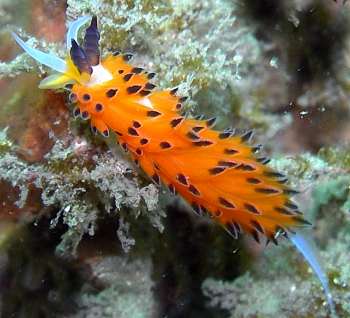
Hello there,
I was wondering if you could ID this nudi for me please. I dont have any reference books yet and I can't seem to find it on your site as I don't know its scientific name. Any help would be appreciated.
Locality: Clifton Gardens, Sydney, NSW, Australia. Depth: 8 m. Length: 3 cm. 23 May 2005. very very silty. Photographer: Nicholas Missenden
Regards
Nick
njmpm@iinet.net.au
Missenden, N., 2005 (May 27) Favorinus tsuruganus from Sydney Harbour. [Message in] Sea Slug Forum. Australian Museum, Sydney. Available from http://www.seaslugforum.net/find/13860Dear Nick,
This is Favorinus tsuruganus, one of a group of aeolid nudibranchs which eat the eggs of other sea slugs. This species was originally described from Japan and subsequently found in eastern Australia. We now have records on the Forum from as far away as the Red Sea so it seems to have a wide distribution in the Indo-West Pacific.
Best wishes,
Bill Rudman
Favorinus tsuruganus in the Red Sea
April 25, 2005
From: Jacob Dafni
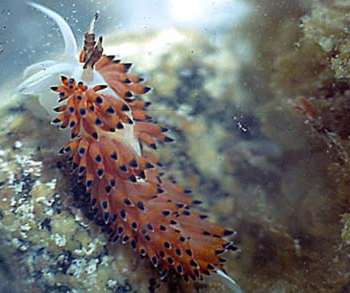

Dear Bill,
This picture is with me sometime. I identified it as Favorinus tsuruganus through your site, but only recently I realized that there is no formal record of this species from the Red Sea.
Locality: Southern Beach, Eilat, Israel. Red Sea. Depth: 5 m. Photographer: J. Dafni.
Jacob Dafni
jdafni@netvision.net.il
Dafni, J., 2005 (Apr 25) Favorinus tsuruganus in the Red Sea. [Message in] Sea Slug Forum. Australian Museum, Sydney. Available from http://www.seaslugforum.net/find/13631Dear Jacob,
Thanks for this record. We have a couple of records on the Forum from Reunion Id, so its known from the western Indian Ocean, but I think yours is the first from the Red Sea region. I hesitate to confirm this as the 'first record' as there is a chance it had been recorded in the literature either as F. tsurugensis or under another name. There is no 'central register' to look up so without diligent searching it is easy to miss an earlier record.
Best wishes,
Bill Rudman
Favorinus tsuruganus from Reunion Island
February 22, 2005
From: Philibert Bidgrain
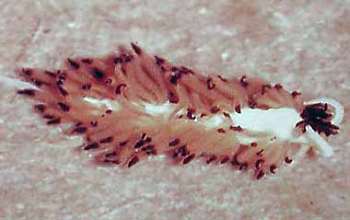
Dear Bill,
Reunion Island sea slugs.
We have only one specimen of this species, observed by Maurice Jay a few years ago...It seems to a specimen of Favorinus tsuruganus
Best Regards
Philibert Bidgrain
http://vieoceane.free.fr/runseaslug/indexslug.htm
pbidgrain@yahoo.fr
Bidgrain, P., 2005 (Feb 22) Favorinus tsuruganus from Reunion Island. [Message in] Sea Slug Forum. Australian Museum, Sydney. Available from http://www.seaslugforum.net/find/13095Dear Philibert,
I think your identification is correct but I can't see any of the distinguishing features, such as the shape of the rhinophores, to be 100% certain.
Best wishes,
Bill Rudman
Favorinus tsuruganus on Goniodoris felis eggs
February 7, 2005
From: Dong Bum Koh
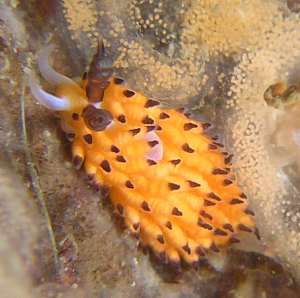
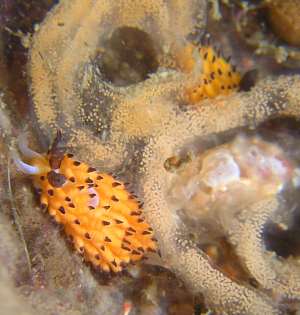
Dear Bill,
To accompany my earlier message on Goniodoris felis from Sth Korea [message #12932], here are some close-ups of two Favorinus tsuruganus which were eating its eggs.
Locality: Jeju Island. Hwa Soon Beach. South Korea. Depth: 4 m. Length: approx 15 mm. 19 Dec. 2004. Sandy bottom with Rock. Photographer: Youn Byung Ro
Dong Bum Koh
drkoh@seasee.co.kr
Koh, D.B., 2005 (Feb 7) Favorinus tsuruganus on Goniodoris felis eggs. [Message in] Sea Slug Forum. Australian Museum, Sydney. Available from http://www.seaslugforum.net/find/13000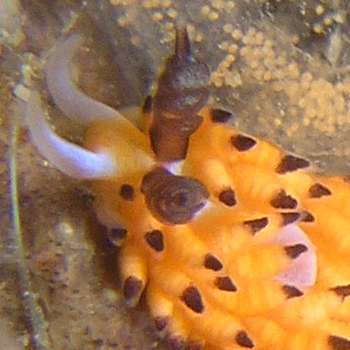
Dear Koh,
Favorinus tsuruganus appears to eat a wide variety of opisthobranch eggs. The photo alongside shows the structure of the rhinophore of this species very well. It also shows a large pink lump on the back of the Favorinus. I guess this is a crustacean parasite, perhaps a copepod. In total these photos show a trophic chain running from compound ascidian > Goniodoris > Goniodoris eggs > Favorinus > crustacean parasite.
Best wishes,
Bill Rudman
Favorinus tsuruganus from Sth Korea
December 19, 2003
From: Dong Bum Koh
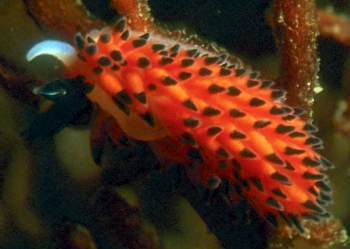
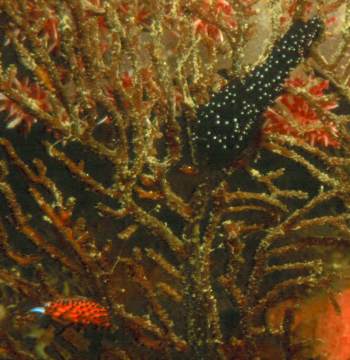
Dear Bill,
This is a photo of Favorinus tsuruganus with Protaeolidella atra in same Solanderia sp.
Could you give me comments?
16 Nov. 2003
Moon islet in Jeju island, Sth Korea.
depth : 12m W/T : 21 degrees
Photographer: Dong Bum Koh
Best regards,
Dong Bum Koh
drkoh@seasee.co.kr
Koh, D.B., 2003 (Dec 19) Favorinus tsuruganus from Sth Korea. [Message in] Sea Slug Forum. Australian Museum, Sydney. Available from http://www.seaslugforum.net/find/11432Dear Dong Bum,
Aeolids which feed on hydroids, soft corals and hard corals are usually found on their food, or near by. Aeolids which feed on solitary organisms, such as sea anemones, are often found away from their food, probably because they have to move around to find their food. Species of Favorinus, which feed on the eggs of other opisthobranchs, are often found away from their food because they need to move a round to find new egg ribbons. I guess that is why this Favorinus tsuruganus is crawling on the Solanderia colony. It is not interested in eating Solanderia, but it is definitely interested in eating egg masses of aeolids, such as Protaeolidella atra, which live and feed on Solanderia.
An exception to the intinerant behaviour of species of Favorinus can be seen when they find a relatively large egg mass, such as that of Hexabranchus or perhaps a Sea Hare. On large egg masses, species of Favorinus can live their whole life cycle on the one egg ribbon, even to the extent of laying their own egg ribbon on the wgg ribbon they are eating [see Marina Poddubetskaia's recent message]
Best wishes
Bill Rudman
Favorinus tsuruganus eating Hexabranchus eggs
December 1, 2003
From: Yves Coze

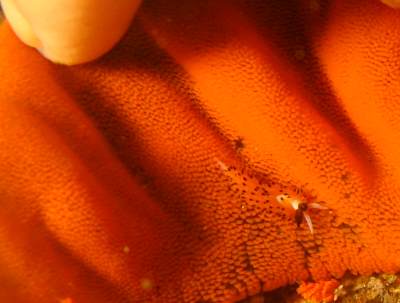
Note: Here is a copy of part of Yves Coze's message on Favorinus eating Hexabranchus eggs so the record of F. tsuruganus can be cross referenced.
Dear Bill,
In addition to the pictures I've sent previously, here are some photos of the Favorinus that are not blurred. They are from Reunion Island, Indian Ocean
Once again they were spotted in a Hexabranchus sanguineus egg ribbon.
Best Regards
Yves Coze
info@rando-reunion.com
Coze, Y., 2003 (Dec 1) Favorinus tsuruganus eating Hexabranchus eggs. [Message in] Sea Slug Forum. Australian Museum, Sydney. Available from http://www.seaslugforum.net/find/11546Dear Yves,
Your photos contained two species of Favorinus. As I said in your other message, this is Favorinus tsuruganus and the other species is F. japonicus.
Best wishes
Bill Rudman
Favorinus tsuruganus from Korea
November 15, 2003
From: Dong Bum Koh
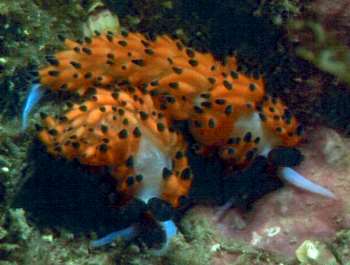
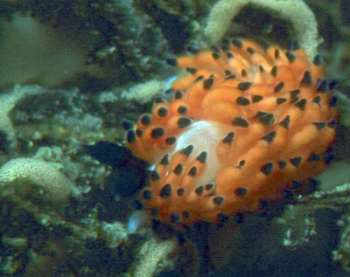
Dear Bill,
Long time no message!
I go to diving every Sunday but I can't find any new ones. Fortunately I found A new one for me - Favorinus tsuruganus.
Moon islet, Jeju island. 8. Nov. 2003
W/T : 22 degrees
Depth : 12 m
Photographer : Dong Bum Koh
I found them eating the eggs of Flabellina bicolor
Best regards,
From Dong Bum Koh
drkoh@seasee.co.kr
Koh, D.B., 2003 (Nov 15) Favorinus tsuruganus from Korea. [Message in] Sea Slug Forum. Australian Museum, Sydney. Available from http://www.seaslugforum.net/find/11383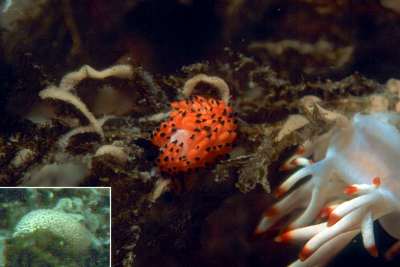
Dear Dong Bum,
Glad to hear from you again - and especially with another interesting feeding observation. Favorinus tsuruganus appears to be a species that will eat a wide variety of opisthobranch eggs
Best wishes
Bill Rudman
Favorinus tsuruganus - egg-laying observations
August 20, 2003
From: Jim Black
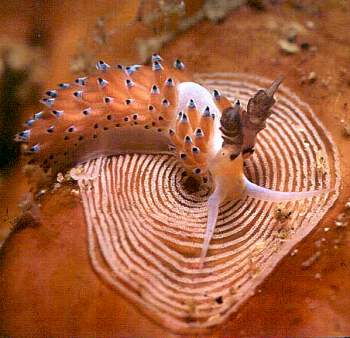
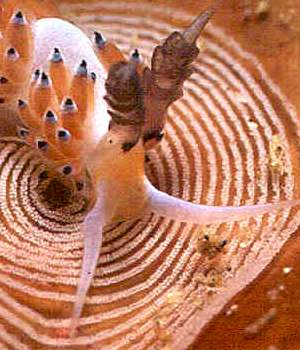
Hi Bill
Here is some behavior for you - from Anilao, Batangas, Philippines
I was taking a pic of a nudi laying eggs on a small piece of dead coral. A nice spiral ... I moved the coral to suit a better photo angle ... as I resettled to shoot ...I noticed that the nudi was now laying the eggs across its pattern. I believe that these little guys have a built-in gyro and heading orientation for navigation ... and when this one got messed up-by me - he continued on the original heading for the continued egg laying spiral .... very interesting!!
All the best
Jim Black
Pittsburgh, Pa
jim.black1@comcast.net
Thanks Jim,
It is certainly an observation worth repeating. There is a lot of interest in the direction they spiral [clockwise or anti-clockwise], but I can't think of anyone who has studied the mechanics of maintaining the spiral during an egg-laying.
By the way, your animal is Favorinus tsuruganus, one of a genus of nudibranchs which feed on the eggs of other opisthobranchs. I can't recall seeing an animal with a whitish region below the black tip of each ceras, but it fits in all other respects.
Best wishes,
Bill Rudman
Nembrotha rutilans & Favorinus tsuruganus
December 30, 2002
From: Mark Burnett
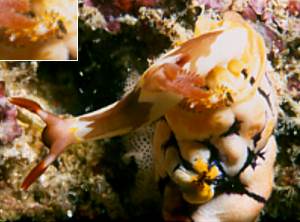
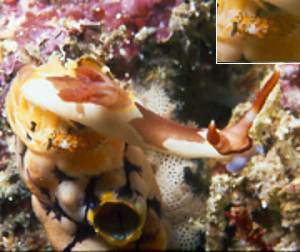
Hi Bill,
I've been an avid reader of your site for some time. This is the first time I've sent anything in. In October a friend and I did a trip to Mabul, Borneo and had 10 wonderful days diving and photographing everything in site. On returning to New Zealand I found that my 13 species of nudibranchs photographed became 14. These slides of Nembrotha rutilans on an ascidian showed a much smaller nudibranch I couldn't identify. Doesn't appear in Debelius' book and it was not until I got a copy of Neville Coleman's 1001 Nudibranchs that I identified it as Favorinus tsuruganus. From your site I see it has been found in New Zealand. If it tends to favour Hexabranchus sanguineus eggs I wonder what species' eggs it feeds on here in NZ?
Mark Burnett
mburnett@actrix.gen.nz
Dear Mark,
Glad to get your first message, and look forward to many more. It's certainly interesting what things you can find when you look closely at your photos. While in tropical waters Favorinus tsuruganus is often found on the eggs of Hexabranchus, there is no good study to show that it doesn't also feed on less conspicuous egg ribbons. I suspect our eyes are attracted to the spectacular Hexabranchus eggs, which are often deposited in very open positions, and we don't look at the many smaller inconspicuous egg ribbons which are often deposited in crevices or under rocks. As David Harasti's message records, F. tsuruganus is found not uncommonly in the temperate waters of New South Wales, in eastern Australia. As in New Zealand, this is not Hexabranchus territory, so I suspect F. tsuruganus will feed on other eggs. As I discuss in the species' Fact Sheet, this is one species of Favorinus in which the colour of the ceratal digestive gland is independent of the colour of the eggs it eats.
Best wishes,
Bill Rudman
Favorinus tsuruganus - feeding on eggs
December 8, 2002
From: Dave Harasti
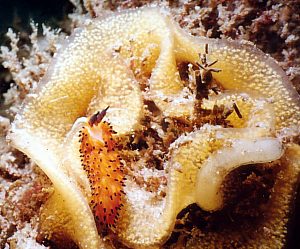

Hi Bill,
Here's an image of Favorinus tsuruganus feeding on nudibranch eggs at Fly Point, Nelson Bay, NSW - Australia. Photo was taken in November 2002 and several individuals of this species have been found recently. Now is also the time that Nelson Bay is full of mating Sea Hares so I'm sure there is a feast of eggs for Favorinus tsuruganus to feed on.
Cheers,
Dave
diving@webone.com.au
Harasti, D., 2002 (Dec 8) Favorinus tsuruganus - feeding on eggs. [Message in] Sea Slug Forum. Australian Museum, Sydney. Available from http://www.seaslugforum.net/find/8589Thanks Dave,
Most records of F. tsuruganus feeding are from tropical waters, where its favourite food is Hexabranchus eggs. It is interesting to get thois feeding record from outside the normal range of Hexabranchus.
Best wishes,
Bill Rudman
Favorinus tsuruganus from Indonesia
November 27, 2002
From: Ginette Allard
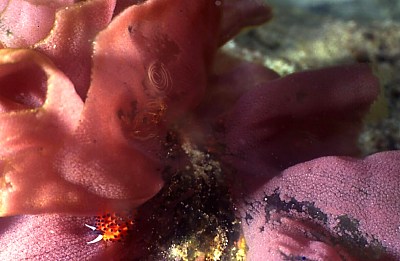
Here is one from Siladen, Indonesia in August 2000 , at low tide. This aeolid has put its eggs [lower left] on a Spanish Dancer's eggs. The aeolid was approx 1cm long. There were 2 at the same place.
Ginette Allard
gigiallard@aol.com
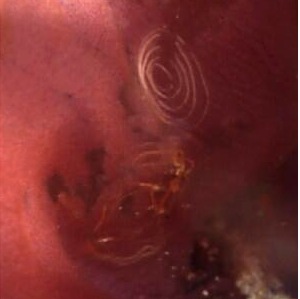
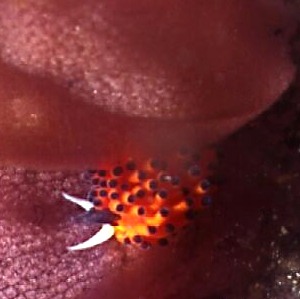
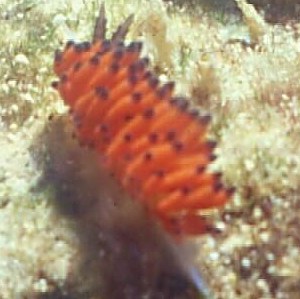
Dear Ginette,
This is Favorinus tsuruganus, which from the various messages on the Forum, seems to prefer the eggs of Hexabranchus. I have included your later photo alongside as it shows the characteristic rhinophores of this species.
Best wishes,
Bill Rudman
Favorinus tsuruganus - new record from N.Z.
February 14, 2002
From: Gareth Jones
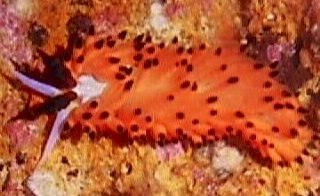
Hello again Bill,
I found this nudibranch at a depth of 15m at a site called Middle Arch at the Poor Knights Islands. It is about 15mm long. As usual any help with ID appreciated.
Cheers
Gareth Jones
Pacific Hideaway Charters
Tutukaka, NZ
rees@divenz.co.nz
Jones, G., 2002 (Feb 14) Favorinus tsuruganus - new record from N.Z.. [Message in] Sea Slug Forum. Australian Museum, Sydney. Available from http://www.seaslugforum.net/find/6149Dear Gareth,
This is another interesting find. Favorinus tsuruganus, first described from Japan has since been found in many parts of the western Pacific but I think this is the first record from New Zealand. It is a member of a genus which feeds primarily on the eggs of other opisthobranchs. It can change in colour from pale yellow to quite a deep orange-red depending on the colour of the eggs it has been eating.
best wishes,
Bill Rudman
Re: Egg eater from Japan
August 5, 2001
From: Nishina Masayoshi
Dear Dr.Rudman,
Concerning my earlier message I asked Mr.Shoichi Kato (owner of The Reglus Diving at Hachijo Is.) about the egg mass the Favorinus were on. He told me that the egg mass of Hexabranchus as you guess. Hexabranchus is common there.
Best Regards,
Nishina Masayoshi
nishina@hpe15.wips.co.jp
Nishina, M., 2001 (Aug 5) Re: Egg eater from Japan . [Message in] Sea Slug Forum. Australian Museum, Sydney. Available from http://www.seaslugforum.net/find/4993Thanks Nishina,
Best wishes,
Bill Rudman.
Egg eater from Japan
July 30, 2001
From: Nishina Masayoshi
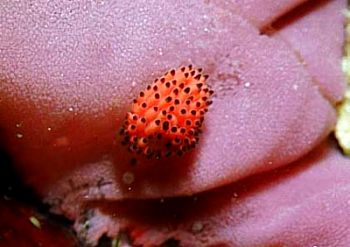
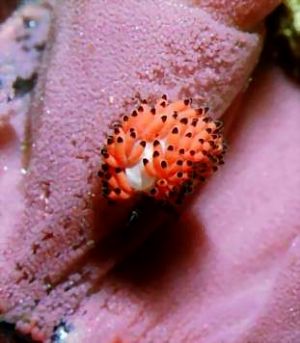
Dear Dr.Rudman,
This I do not find often, so I guess this is
not that common here.
Data:
Date: 30 Sep, 2000
Place: Nazumado, Hachijo Island, Japan
Depth: 6m
Size: 10mm
Best Regards,
Nishina Masayoshi
nishina@hpe15.wips.co.jp
Nishina, M., 2001 (Jul 30) Egg eater from Japan. [Message in] Sea Slug Forum. Australian Museum, Sydney. Available from http://www.seaslugforum.net/find/4958Dear Nishina,
This is Favorinus tsuruganus, which was first described from Japan, but is now known to be widespread, at least in the western Pacific. Most species of Favorinus appear to be uncommon, but I think it is a question of finding the egg masses they feed on. I don't know whether each species of Favorinus prefers the egg masses of particular species, but Favorinus japonicus, is often very common when Sea Hares are breeding, feeding on their egg masses.
Many nudibranchs, and other sea slugs, appear to be rare until we know something about their natural history - their food, their breeding cycle, etc., Then we know where to look for them.
Thanks for these interesting photos. It is possibly the egg mass of Hexabranchus. If that could be confirmed, it would be interesting, because in an earlier message Stuart Hutchison reported F. tsuruganus feeding on their eggs.
Best wishes,
Bill Rudman
Re: Colour of Favorinus tsuruganus
June 4, 2001
From: Stuart Hutchison


Bill,
Your comments have answered lots of questions this time!You may notice the pink remnants of a Spanish Dancer (Hexabranchus sanguineus ) eggmass between the two Favorinus tsuruganus on this rock. There were dozens of Spanish Dancers and their eggs about the place and the eggs ranged from quite pink to distinct red like these guys. I guess we found them just after the feast. There was a strong current running at the time and I suppose they were too tired to move on right away! Hope we've helped build your database.
Regards,
Stuart
hutchco@tpg.com.au
Hutchison, S., 2001 (Jun 4) Re: Colour of Favorinus tsuruganus. [Message in] Sea Slug Forum. Australian Museum, Sydney. Available from http://www.seaslugforum.net/find/4487Thanks Stuart,
I'm glad I mentioned its food. I was going to suggest that perhaps it was eating something red but I didn't want to ask you what lawyers would call "leading questions". From your magnified photo of the cerata it certainly looks like they have just had a large meal. Your contributions are definitely helping to build the Forum into a valuable database of information on these amazing animals
best wishes,
Bill Rudman.
Favorinus tsuruganus from Indonesia
June 3, 2001
From: Stuart Hutchison
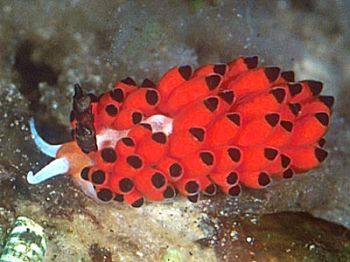
Bill,
Long time no speak. I can't say I have been able to find this guy in any of the books on nudibranchs - and I own most of them. Found by Melinda in 4m of water on a Tulumben [Indonesia] night dive on 24 May 2001. This animal was about 30mm long. It had a smaller mate about 20mm long which I'll scan and send you ASAP. Perhaps you can shed some light on it for us.
Regards,
Stuart
hutchco@tpg.com.au
Hutchison, S., 2001 (Jun 3) Favorinus tsuruganus from Indonesia. [Message in] Sea Slug Forum. Australian Museum, Sydney. Available from http://www.seaslugforum.net/find/4476Dear Stuart,
This is Favorinus tsuruganus. Your animal is much more heavily pigmented than most specimens I have seen. The orange on the head and the opaque white oral tentacles and white markings on the back are much more obvious than the more subtle colours seen in my photos above. The other difference is the colour in the ceratal digestive gland - usually a paler yellow rather than the reddish orange in your animal.
F. tsuruganus, like all species of Favorinus feeds on opisthobranch eggs, the colour of the digestive gland being dependent on the colour of the eggs they have been eating [see F. japonicus. It looks like your animal has been feeding on a very brightly coloured egg ribbon. I look forward to seeing the photo of the smaller animal.
Best wishes,
Bill Rudman
Photo of Favorinus tsuruganus
March 19, 1999
From: Lindsay Warren
Dear Bill,
Do you know of any good shots of Favorinus tsuruganus on the web? I checked one by it seemed rather dark.
Once again, many thanks for all your help.
Best wishes
Lindsay
100014.2112@compuserve.com
Warren, L., 1999 (Mar 19) Photo of Favorinus tsuruganus. [Message in] Sea Slug Forum. Australian Museum, Sydney. Available from http://www.seaslugforum.net/find/700Dear Lindsay,
Have a look at the top of this page. I have posted a picture of Favorinus tsuruganus for you. The Forum needs a few more aeolid pictures.
Bill Rudman.
